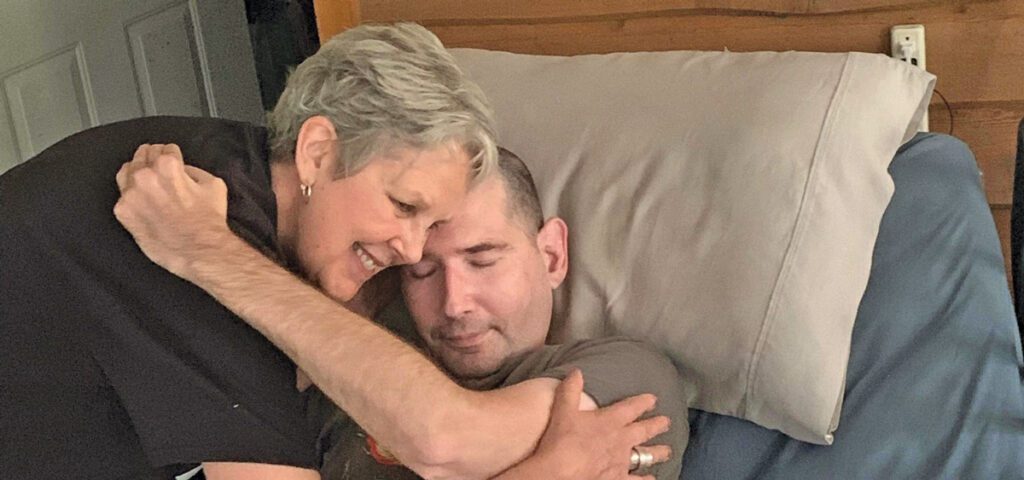
Photo courtesy of Marsi Parker Darwin
Eric Parker was a self-described “earth traveler” who lived by his wits and took great pride in his independence as a schizophrenic, unhoused man. He was highly intelligent, a lover of birds and animals, and a solo explorer of Ann Arbor and southern California. His last year of life was spent under the care of the author, his aunt, who deeply misses her firstborn nephew, a complicated, remarkable human.
My brother Chris and his pregnant wife were hit head-on by a drunk driver two months before Eric was born. Hospitalized with serious injuries, it was feared they had lost the baby, but a monitor picked up a fetal heartbeat. We were all incredibly relieved.
On St. Patrick’s Day 1979, my sister-in-law gave birth to my nephew Eric. A few minutes after that, she delivered his dead twin—a shock to everyone. The doctor said he had stopped developing at around seven months, no doubt as a result of the accident. When Eric was little, he told us he heard voices. “I think I have a brother,” he told me once. “I think he follows me around.”
Eric’s parents had a tempestuous marriage. My brother’s penchant for motorcycles, drugs, and alcohol didn’t make for a great husband or father. His wife had migraines and sometimes locked herself in her bedroom. After the birth of twin girls, they tried to make their marriage work, but it didn’t.
Eric was forty when he came to live in our home in the last year of his life. He had stage four Hodgkin’s lymphoma. Being paranoid schizophrenic in a society offering little help for its mentally ill, he’d been homeless for twenty years. We spent our days conversing about his life.
He said he’d first smoked pot at age eleven and someone may have given him LSD around that time, too. “Your dad?” I asked, not really wanting to know the answer.
“Maybe,” he replied, not looking me in the eye.
At sixteen, Eric quit school and moved in with his divorced dad and later with his maternal grandparents in Ann Arbor. In his early twenties, his schizophrenia was diagnosed. He wore it like a badge. “I’m not crazy,” he’d tell you. “I don’t have mental problems. I’m schizophrenic. I’m not stupid. They think Einstein was schizophrenic; Winston Churchill; all your great artists and writers. Look it up if you don’t believe me.”
Shortly before he turned thirty, I bumped into him at the Ann Arbor Art Fair. His six-foot-three frame, long blond ponytail, and lurching gait were unmistakable. He seemed happy to see me and a friend visiting from Texas, and offered to take us on a tour of seldom-seen Ann Arbor landmarks.
It was a meandering path of public restrooms, pool halls, and vending machines. At the Michigan Union a security guard recognized Eric and refused him entrance.
“Don’t we all have the right to be here?” Trisha demanded in her Texas twang. “This boy is our friend.”
The guard backed off, and Eric was visibly relieved.
A few years later, in 2011, he appeared at my father’s funeral in a wheelchair. Word was that he’d been in California, living on the streets. He’d worn his hiking boots constantly, fearing they’d be stolen if he took them off, and developed an infection.
Eric headed back to California, and that was the last we heard of him for eight years. Apparently he was in and out of nursing facilities, or living at the beach and on the streets. But he later told me that in 2017, he began immunotherapy for Hodgkin’s at UCLA hospital.
The drug they used, nivolumab, had a nasty potential side effect: peripheral atrophy. When he felt his limbs stiffening, Eric returned to Michigan.
He arrived at Detroit Metro in the fall of 2018 in his wheelchair, a lime-green backpack on his lap. He was sent to Beaumont Hospital and then to a group home on Woodward. But there, he told me, a “mean lady” berated him and “stole his stuff.” So he decided to go to Ann Arbor.
With a burner phone and a debit card he’d kept in a secret pocket, he called an Uber. He waited in his wheelchair at the curb and waved goodbye to the mean lady as they drove to what was then St. Joseph Mercy Hospital.
St. Joe’s did not admit him, nor did the homeless shelter. But then it started snowing. In January 2019, he was admitted to U-M Hospital with pneumonia.
His father had died two years earlier and his mother and sisters, who’d had problems with Eric in the past, were unable or unwilling to help. So they called me. I imagined my brother perching on my shoulder, whispering: “Please take care of my boy.”
My husband and I visited Eric in the hospital regularly for the next month. When a court-ordered guardian sent him to a nursing home near Detroit, we visited weekly. But the conditions there were poor, and Eric was miserable.
His atrophy had extended to his hands, which were curled into claws. Completely unable to use his right hand, he was somehow able to text me with his left, chronicling his mistreatment: He’d been abandoned in a wheelchair for hours, he wrote, given “physical therapy” that felt like torture, and delivered unappealing meals that were sometimes collected untouched, since he was unable to feed himself with utensils.
For his fortieth birthday, he asked us to bring him Pop-Tarts and pizza, because he could wedge them into his left hand and bring them to his mouth. A few days later, Eric was transported back to U-M for an oncology appointment, where we were told that there was nothing more they could do for him. The next morning, I filed for guardianship at the Washtenaw County courthouse.
I spent weeks getting ready for Eric’s arrival, having equipment delivered to our walk-out basement room: a hospital bed, a Hoyer lift, a geri chair recliner. A bulletin board held photographs of our family.
I positioned his bed with a view of the pond, where he could watch our peacocks, ducks, and chickens. I hung bird feeders in the window. Eric loved birds and animals—even at his makeshift camps in the woods, he’d hung out suet feeders. He was thrilled when our new kitten camped out on his bed.
I knew it wouldn’t be easy having Eric in our home. I’d have to do virtually everything for him: turning him regularly to prevent bedsores, feeding and changing him. It was like having a giant, grumpy baby. But who wouldn’t be grumpy if you couldn’t care for yourself, especially as a forty-year-old?
We spent a lot of time talking. I learned about a life completely unknown to me and most Americans—a life unfortunately all too common among the mentally challenged. Unable to find work or housing, somehow they survive.
In spite of bad luck and poor choices, Eric wasn’t murdered or put in prison or a psych ward. He loved telling stories of his former life. He’d start with “I miss California” or “I miss bicycling along the Huron River,” and launch into a tale. Here are some of his tales, in his own words:
You know that little traffic triangle near Weber’s, where the highway merges with Jackson Rd.? There’s a little patch of brush and weeds. Maybe it’s not there any-more. But I used to live there. I had a little tent that was hidden in the weeds and bushes. I wish I was there right now.
I was snug in there. I had a good sleeping bag and food and a CD player. Nobody bothered me. I could hear cars going by on both sides of me, but nobody stopped. Nobody knew I was there. I took good care of myself. It was cool.
When I first tried living on the street, I asked another homeless guy, “Am I doing this right?”
“Yep,” he said. “You can just sit there all day.”
“But shouldn’t I be doing something with my time?”
“Nope,” he said. “Here, have a cigarette.”
I read The Beggar’s Handbook. It taught me how to panhandle. It had a lot of good pointers. But it lied when it said you can make $200 a day. I might get $12 or sometimes nothing. I think people were afraid of me. I wasn’t your stereotypical homeless person. I tried to be more of a hippie.
People seem surprised when I use big words or make a joke. But I’m super-smart. I don’t mind saying that because I am. I didn’t graduate high school, but I don’t like to admit it. One of my grandpas was a college professor and the other was a ship’s captain on the Great Lakes. You don’t get those jobs if you’re dumb. My dad went to college. My mom was a nurse, and so was her mom. Brains run in my family. Just because you’re schizophrenic doesn’t mean you’re stupid.
The worst part of being homeless was nothing to do. It could be boring. One of the nice places where they didn’t bug me too much was the 8 Ball under the Blind Pig. If it was real cold out, they let me play darts and pool all night, if I came up with the price of a beer. They were cool.
Sometimes I’d float down the Huron River and see deer watching me. That made me happy.
Mice weren’t afraid of me. They knew me. When I was living in the woods, they never messed with my stuff. They never chewed through anything. This one mouse liked me so much it made my heart feel nice. It knew I wouldn’t hurt it. It would sit about an inch from my leg. It made me feel not so cold when the mouse was there. It believed in me. It would hang out and drink coffee or cocoa with me. I’d feed it ramen noodles. The mice made secret tunnels in the snow. They were playful and happy.
You knew about the place I had by the Gandy Dancer, that train depot turned restaurant. I didn’t have a tent then, just a tarp stretched out in the trees. You and Uncle Bill picked me up one time at the Fleetwood Diner, remember? You bought me some food, and I asked you to drop me off there near the woods. I didn’t want you to know the exact location. People stole my stuff from there all the time. But I still felt safe there. I could hear the train go by at night. It was cool.
My last winter in Ann Arbor, I slept under the overpass near Maple. It was cold. It was really freakin’ cold. But that was my last winter here in Michigan.
Eric’s stories stopped right after Thanksgiving. Too weak with pneumonia to speak, he struggled to open his eyes. I whispered that maybe he’d be able to walk again soon and would be walking on the beach, maybe with his dad and his brother. He went to sleep and didn’t wake up.
Eric was happy that I wanted to share his story. He was a true survivor, against the odds; in spite of the failure of family, society, and his own human frailty. There was greatness in him. He found his way home. And that’s very, very cool.
Read more of Eric’s story at darwinseden.com



What a wonderful story. Thank you for sharing it. May Eric rest in peace and do all the things again that he loved to tell you about. -Peace, Kitty